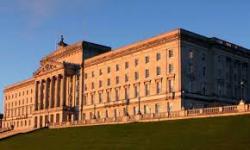By Harry Hutchinson
(Labour Northern Ireland, Mid-Ulster branch, personal capacity)
The Government of Northern Ireland collapsed 14months ago, with no prospect in sight of it being re-established. Polarisation of the people now is preventing any establishment of the political institutions returning.
Fourteen months ago Sinn Fein, the main nationalist party collapsed the government in Stormont, after the exposure of corporate and government fraud in the Renewable Heat Incentive scheme (RHI), which cost the public exchequer £400m. Known as the “cash for ash” scheme, wood-burning businesses were paid to burn as much fuel as possible at the expense of public funds. Arleen Foster, then head of the DFI department which introduced the scheme, refused to step down as First Minister at the request of Sinn Fein, when the scheme came to public attention, resulting in Sinn Fein pulling out of the government. It emerged later that both of the main Northern Ireland parties, DUP and Sinn Fein, had been promoting the flawed scheme.
The background to Sinn Fein pulling out of Stormont lies not really in the RHI scheme, but in discontent in their movement. Sinn Fein not only promotes itself as a nationalist 32-county all Ireland party, but also a ‘socialist’ party, particularly in the South. Since going into coalition with the DUP in the North, there has been almost two decades of public sector cuts, particularly hospital closures, and this has caused discontent among rank and file Republican supporters.
The aim of Sinn Fein over the last year is to push the agenda away from social issues to a national sectarian agenda. First a border poll for an all-island Ireland, mixed with LGTB rights; then moving to Irish language rights written into law.
The latest negotiations between the two main parties had reached agreement on the main outstanding issue of the Irish language. But with the resurrection of the Stormont Government looking imminent, grass-roots Unionist voters had the final say on the matter and rejected any prospect of joint English and Irish names on road and housing estate signs. Both parties have reached stalemate, yet the British government refuses to reintroduce direct rule.
Northern Ireland is more polarised than at any time in its history. Decades of paramilitary violence, further exacerbated by sectarian issues like parades and flags by Unionist and Nationalist parties have divided the two communities. Poverty plays a huge part in this division. According to the Joseph Rowntree Foundation, in 2016, 370,000 people, one in five of the population live below the breadline, mainly among single parents with children. Such poverty has led to lower life expectancy. The same report has shown that one in five ten- to fifteen-year olds have moderate to severe mental health problems, some of which stem from the legacies of the troubles.
Many people in Northern Ireland, while they face an uncertain future, have to endure the sectarian squabbling of those parties that have dominated local politics for decades. While these parties rely on the division of the people on the National/border issue; rumblings of discontent on the real issues like poverty and other social issues are held in check.
February 28, 2018



